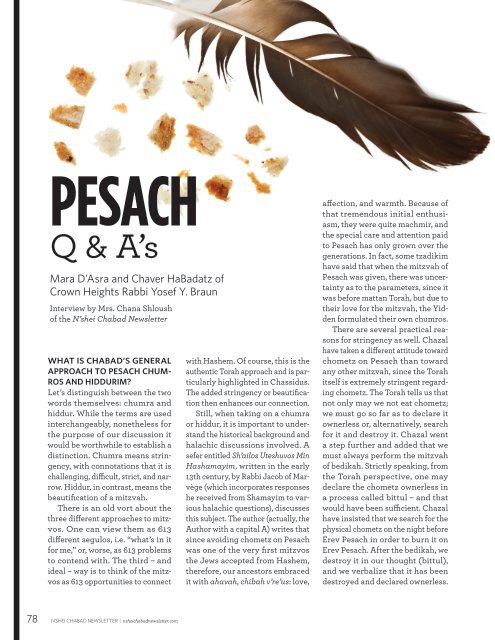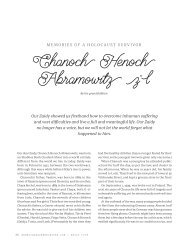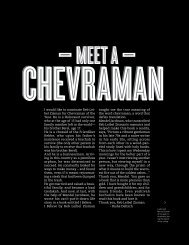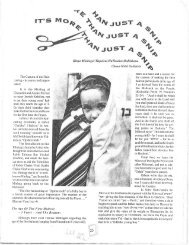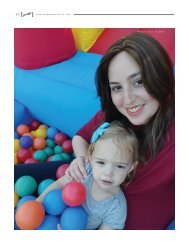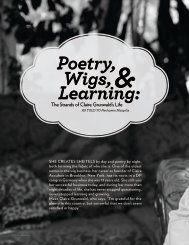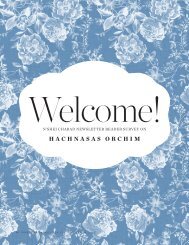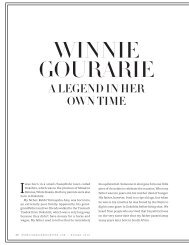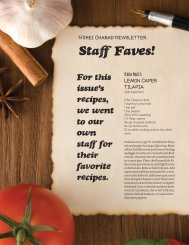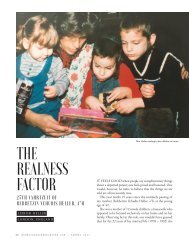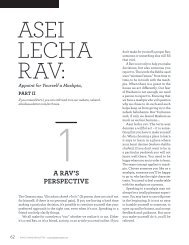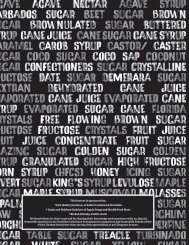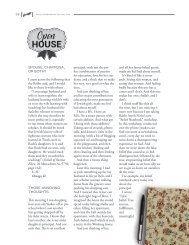Create successful ePaper yourself
Turn your PDF publications into a flip-book with our unique Google optimized e-Paper software.
<strong>PESACH</strong><br />
Q & A’s<br />
Mara D’Asra and Chaver HaBadatz of<br />
Crown Heights Rabbi Yosef Y. Braun<br />
Interview by Mrs. Chana Shloush<br />
of the N’shei Chabad Newsletter<br />
WHAT IS CHABAD’S GENERAL<br />
APPROACH TO <strong>PESACH</strong> CHUM-<br />
ROS AND HIDDURIM?<br />
Let’s distinguish between the two<br />
words themselves: chumra and<br />
hiddur. While the terms are used<br />
interchangeably, nonetheless for<br />
the purpose of our discussion it<br />
would be worthwhile to establish a<br />
distinction. Chumra means stringency,<br />
with connotations that it is<br />
challenging, difficult, strict, and narrow.<br />
Hiddur, in contrast, means the<br />
beautification of a mitzvah.<br />
There is an old vort about the<br />
three different approaches to mitzvos.<br />
One can view them as 613<br />
different segulos, i.e. “what’s in it<br />
for me,” or, worse, as 613 problems<br />
to contend with. The third – and<br />
ideal – way is to think of the mitzvos<br />
as 613 opportunities to connect<br />
with Hashem. Of course, this is the<br />
authentic Torah approach and is particularly<br />
highlighted in Chassidus.<br />
The added stringency or beautification<br />
then enhances our connection.<br />
Still, when taking on a chumra<br />
or hiddur, it is important to understand<br />
the historical background and<br />
halachic discussions involved. A<br />
sefer entitled Sh’ailos Uteshuvos Min<br />
Hashamayim, written in the early<br />
13th century, by Rabbi Jacob of Marvège<br />
(which incorporates responses<br />
he received from Shamayim to various<br />
halachic questions), discusses<br />
this subject. The author (actually, the<br />
Author with a capital A) writes that<br />
since avoiding chometz on Pesach<br />
was one of the very first mitzvos<br />
the Jews accepted from Hashem,<br />
therefore, our ancestors embraced<br />
it with ahavah, chibah v’re’us: love,<br />
affection, and warmth. Because of<br />
that tremendous initial enthusiasm,<br />
they were quite machmir, and<br />
the special care and attention paid<br />
to Pesach has only grown over the<br />
generations. In fact, some tzadikim<br />
have said that when the mitzvah of<br />
Pesach was given, there was uncertainty<br />
as to the parameters, since it<br />
was before mattan Torah, but due to<br />
their love for the mitzvah, the Yidden<br />
formulated their own chumros.<br />
There are several practical reasons<br />
for stringency as well. Chazal<br />
have taken a different attitude toward<br />
chometz on Pesach than toward<br />
any other mitzvah, since the Torah<br />
itself is extremely stringent regarding<br />
chometz. The Torah tells us that<br />
not only may we not eat chometz;<br />
we must go so far as to declare it<br />
ownerless or, alternatively, search<br />
for it and destroy it. Chazal went<br />
a step further and added that we<br />
must always perform the mitzvah<br />
of bedikah. Strictly speaking, from<br />
the Torah perspective, one may<br />
declare the chometz ownerless in<br />
a process called bittul – and that<br />
would have been sufficient. Chazal<br />
have insisted that we search for the<br />
physical chometz on the night before<br />
Erev Pesach in order to burn it on<br />
Erev Pesach. After the bedikah, we<br />
destroy it in our thought (bittul),<br />
and we verbalize that it has been<br />
destroyed and declared ownerless.<br />
78 N’SHEI CHABAD NEWSLETTER | nsheichabadnewsletter.com
our love for this mitzvah.<br />
In addition to all the above, we<br />
have the spiritual dimension. It is<br />
quoted in the name of the Arizal<br />
that one who is careful about a<br />
speck of chometz on Pesach is protected<br />
from sin year-round. Because<br />
chometz represents the yetzer hara<br />
and the ego, we need to work full<br />
force against it (as per Responsa<br />
from the Radbaz). There are only<br />
three other things which the Torah<br />
forbids b’mashehu, even a minute<br />
amount: anger, arrogance and avodah<br />
zarah. Chometz is symbolic<br />
of all of the above. However, here<br />
is a crucial caveat: If being machmir<br />
on Pesach enhances our ego<br />
(engendering a “holier than thou”<br />
attitude toward others who are less<br />
machmir) or leads to anger in the<br />
household, we are defeating the<br />
purpose and allowing our chumros<br />
to become a stumbling block.<br />
out that the rasha in the Haggadah<br />
was referring to the avodah of the<br />
korban Pesach exclusively, whereas<br />
today’s Jews are complaining about<br />
all the extra chumros. Nevertheless,<br />
if we fall into the trap of complaining,<br />
we are defeating the purpose.<br />
DOES THAT MEAN WE SHOULD BE<br />
LESS EXACTING ON OURSELVES?<br />
Not necessarily. Another perspective<br />
on Pesach chumros, from the<br />
Shulchan Aruch (Alter Rebbe<br />
442:30), is that Yisroel kedoshim<br />
heim – the Jews are holy: they<br />
scrape their chairs and walls. Even<br />
though the tasks are not necessary<br />
according to the letter of the law,<br />
the Rishonim tell us – and Shulchan<br />
Aruch quotes this – that the<br />
Jews are considered a holy nation<br />
for performing them. The Shulchan<br />
Aruch adds (O.C. 442:6): Yesh lahem<br />
al mah she’yismochu – they have<br />
If being machmir on Pesach enhances our ego (engendering a<br />
“holier than thou” attitude toward others who are less machmir)<br />
or leads to anger in the household, we are defeating the purpose<br />
and allowing our chumros to become a stumbling block.<br />
Furthermore, Chazal say we are<br />
not permitted even a mashehu of<br />
chometz in a mixture, unlike other<br />
mitzvos where a tiny amount of<br />
the forbidden might be allowed in<br />
a mixture, in some cases, as determined<br />
by a Rav.<br />
One of the reasons for all these<br />
extra safeguards regarding chometz<br />
is due to the fact that chometz is<br />
permitted year-round, unlike traife,<br />
which is always forbidden. The<br />
extra care we take regarding Pesach<br />
serves as a margin of safety as we<br />
separate ourselves from what is<br />
otherwise allowed.<br />
In later times, more Rabbinic<br />
prohibitions were added. Kitniyos<br />
(beans, legumes, rice, etc.) is<br />
an example of food which is not<br />
chometz but which Ashkenazi poskim<br />
have forbidden on Pesach. Of<br />
course, all of Ashkenaz Jewry has<br />
accepted the prohibition of kitniyos<br />
on Pesach, and even some<br />
Sefardim have taken upon themselves<br />
this issur. Even in times of<br />
severe famine, the Tzemach Tzedek<br />
(among other Poskim) treated<br />
kitniyos almost as serious a prohibition<br />
as actual chometz (except<br />
for the infirm or for children). It’s<br />
important to always keep our focus<br />
on the fact that the Jewish people’s<br />
becoming increasingly machmir<br />
through the ages stemmed from<br />
In being machmir on Pesach, people<br />
sometimes violate an explicit<br />
din in Shulchan Aruch (Alter Rebbe<br />
469:5) because they say, “How difficult<br />
this Pesach is for me!” Such an<br />
expression sounds like the words of<br />
the rasha in the Haggadah, “What<br />
is this work to you?” The reality,<br />
however, is that people do feel this<br />
way and therefore they express<br />
it. The Alter Rebbe was melamed<br />
zechus on such people by pointing<br />
a basis to rely upon. This turn of<br />
phrase is generally reserved for discussing<br />
a leniency, since normally<br />
we would not be halachically lenient,<br />
unless there was a real halachic<br />
basis. Why is this expression used<br />
here when discussing a chumra?<br />
The Maadanei Shmuel brings the<br />
following explanation from Reb<br />
Yaakov Yosef of Ostra (and a similar<br />
thought is also found in Mishna<br />
Berurah on this halachah): Here<br />
APRIL 2014<br />
79
Rabbi Yosef Y. Braun<br />
we learn an important perspective<br />
that our chumros must also have a<br />
basis, a real source backing it up.<br />
The chumros should not be a chassidus<br />
shel shtus – a foolish piety...<br />
An individual cannot simply add<br />
his own made-up stringencies to<br />
the list. All chumros must stem<br />
from an actual halachic source, or<br />
at least from a specific community<br />
minhag or family mesorah.<br />
HOW IMPORTANT IS THE DIS-<br />
TINCTION BETWEEN HALACHAH<br />
AND CHUMRA?<br />
It is important to distinguish,<br />
because there are clear differences.<br />
This is one of the many reasons<br />
offered (see Derech Pikudecha Mitzvah<br />
12) as to why we all eat matzah<br />
shruyah on Acharon Shel Pesach: if<br />
other Torah-true Jews are eating it<br />
throughout the Yom Tov, it surely is<br />
halachically permissible after all.<br />
In order that we don’t create any<br />
notion that others are eating something<br />
which might be chometz, chas<br />
v’sholom, we go out of our way on<br />
the last day of Pesach to drop this<br />
particular chumra. (Of course, other<br />
reasons are offered why we<br />
eat shruyah specifically on<br />
Acharon Shel Pesach and why<br />
we don’t take this approach<br />
with other chumros.) Reb<br />
Michel Zlotchover’s son, Reb<br />
Binyomin Zev, was exceedingly<br />
machmir on Pesach and<br />
of course always ate matzah<br />
shmurah. At one occasion, he<br />
noticed his followers humiliating<br />
a Yid for eating matzah<br />
that was only guarded from<br />
the time of grinding. He stood<br />
up and said: “You think that<br />
so many Yidden who aren’t<br />
machmir on shmurah are eating<br />
chometz on Pesach? Chas<br />
v’sholom. Certainly, these<br />
matzos are very kosher.” He then<br />
asked for some only-from-time-ofgrinding<br />
matzah and ate it in the<br />
presence of all the chassidim.<br />
Relying on Hashem and maintaining<br />
proper humility and respect<br />
for others on Pesach are the themes<br />
of this eye-opening story which<br />
the Rebbe told at a farbrengen on<br />
Shabbos Parshas Ha’azinu 5722.<br />
(While the story is not printed in<br />
the transcript of the sichos, and<br />
some have doubted the veracity<br />
of the story as it appears in other<br />
sources differently, my father-inlaw,<br />
Rabbi Berel Lipskier, zol gezunt<br />
zein, testifies that he heard it personally<br />
from the Rebbe): A certain<br />
chossid of the Tzemach Tzedek was<br />
extremely careful in his Pesach<br />
preparations, doing everything<br />
himself including baking his own<br />
matzos. He wouldn’t use the regular<br />
water in his house obtained by<br />
the water carrier, preferring to draw<br />
water from a covered well behind<br />
his home. He didn’t want to eat in<br />
the Tzemech Tzedek’s house, so he<br />
only visited the Tzemach Tzedek<br />
on the last day of Pesach. At that<br />
time the Tzemach Tzedek told the<br />
chossid, “I want you to know that<br />
you had chometz the entire Yom<br />
Tov. Check the well behind your<br />
house.” The man ran to the well and<br />
discovered a loaf of bread floating<br />
on the surface. Distraught, he ran<br />
back to the Tzemach Tzedek and<br />
said, “I have three questions: Why<br />
did I receive such a serious punishment<br />
when I was so careful to avoid<br />
chometz? Why did the Rebbe not<br />
warn me? What is my tikkun?” The<br />
Rebbe replied, “I didn’t see you all<br />
Pesach so I couldn’t warn you. What<br />
occurred is not a punishment, but a<br />
direct result of your own actions –<br />
you relied only upon yourself and<br />
forgot about siyata d’Shmaya.” The<br />
Rebbe then gave the man a tikkun.<br />
SO, IF ONE WISHES TO OBSERVE<br />
EXTRA CHUMROS FOR <strong>PESACH</strong>,<br />
WHAT IS THE PROPER APPROACH?<br />
Simchas Yom Tov, celebrating<br />
Pesach with joy, is a mitzvah from<br />
the Torah for men, women and children.<br />
Hiddurim, on the other hand,<br />
are just that – hiddurim, not obligations.<br />
If Pesach puts someone in a<br />
Tishah B’Av mood, hiddurim are out<br />
of place (see Chassidim Mesaprim<br />
I:637). People need to approach a<br />
Rav or mashpia with any questions.<br />
They may learn that some of their<br />
so-called “hiddurim” have no basis<br />
whatsoever in halachah or minhag.<br />
The Rebbe quotes (in his account<br />
of Pesach 5692 with the Frierdiker<br />
Rebbe) in the name of the Rebbe<br />
Rashab that one should not take on<br />
extra chumros on Pesach, so that one<br />
will not be making a neder. On a different<br />
occasion, the Rebbe Rashab<br />
said after selling his chometz, “I’m<br />
very scared of chumros.” This is<br />
difficult to understand; the Alter<br />
80 N’SHEI CHABAD NEWSLETTER | nsheichabadnewsletter.com
Rebbe brings from the Arizal that<br />
one should “follow all chumros<br />
regarding chometz.” Indeed, the<br />
Rebbe Rashab himself observed<br />
many extra chumros beyond the<br />
norm on Pesach. One lesson we<br />
can learn from the Rebbe Rashab’s<br />
strong language is the importance<br />
of taking on our Pesach hiddurim<br />
“bli neder.”<br />
Not all hiddurim are suitable<br />
for all people. A person has to be<br />
makir es mekomo: to know whether<br />
a practice is suitable to take on or<br />
whether it is beyond their level. Discuss<br />
this with a mashpia or Rav. And<br />
when one decides to keep a particular<br />
hiddur, one should do so with<br />
both simchah and humility, recalling<br />
that many people of the highest<br />
(This stringency became the norm<br />
in the time of the Rebbe Maharash.)<br />
Whether or not we keep a particular<br />
minhag or hiddur, it’s vital to<br />
emphasize the importance of not<br />
undermining, chas v’sholom, any<br />
minhag Yisroel practiced by others.<br />
WHAT SHOULD BE DONE IF A PER-<br />
SON REALIZES THEIR <strong>PESACH</strong><br />
HIDDUR IS BEYOND WHAT THEY<br />
ARE CAPABLE OF DOING?<br />
There is always the option of doing<br />
hataras nedarim when one realizes<br />
a certain practice cannot be kept<br />
any longer. Consult a Rav who is<br />
a moreh hora’ah b’poel (an experienced<br />
Rav) if necessary.<br />
CAN THE RAV DISCUSS HALACHAH<br />
AND HIDDUR IN CLEANING FOR<br />
long as one realizes it is extra work<br />
and has nothing to do with Pesach.<br />
As mentioned, if one wants to perform<br />
extra hiddurim, one should<br />
appreciate that this is a hiddur, done<br />
out of a love for the mitzvah and<br />
not complain about the difficulty.<br />
And really, why not wash curtains<br />
and windows before Shavuos? Or<br />
in honor of Rosh Hashanah?<br />
Pesach cleaning today is often<br />
much harder than it was centuries<br />
ago. We have larger houses and far<br />
more possessions. In addition, we<br />
do not have many maids and servants<br />
– plus a grandmother and<br />
extended family living with us –<br />
as did our ancestors with small<br />
homes. It is critical to keep in mind<br />
the halachah, “A place into which<br />
Hiddurim, on the other hand, are just that – hiddurim, not obligations.<br />
If Pesach puts someone in a Tishah B’Av mood, hiddurim<br />
are out of place.<br />
spiritual caliber did not keep such<br />
hiddurim. The great chossid Reb<br />
Noteh of Malastirchina never ate<br />
shmurah matzah in his life. (Keep<br />
in mind, in earlier times all matzah<br />
was hand-made, but most was<br />
guarded from contact with water<br />
only from the wheat-grinding stage,<br />
not from the time of harvest. Today<br />
all hand-made matzah is shmurah<br />
matzah, guarded from harvest.)<br />
Reb Noteh would say, “I don’t know<br />
when I should begin [observing this<br />
hiddur].” Of course, nowadays we<br />
all insist on eating only shmurah.<br />
<strong>PESACH</strong>?<br />
When cleaning, some people overdo<br />
Pesach hiddurim in an inappropriate<br />
way. People often confuse Pesach<br />
cleaning with spring cleaning, saying,<br />
“I might as well...” However, if<br />
one runs into a time management<br />
problem, one can develop a negative<br />
attitude toward Pesach altogether.<br />
It is important to separate Pesach<br />
cleaning from spring cleaning,<br />
as was famously said, “Dirt is not<br />
chometz, and children are not the<br />
korban Pesach.” If one wants to do<br />
spring cleaning, one may do so as<br />
one doesn’t bring chometz does<br />
not require bedikah.” We have a<br />
halachic definition of such a spot:<br />
In the middle of a meal, you would<br />
not get up from the table and take<br />
things from that place. Of course, in<br />
a house with young children, many<br />
additional areas must be checked<br />
because children don’t necessarily<br />
follow such rules. But one need only<br />
check places where children can<br />
reach, not the high shelves they cannot<br />
access or places like the boiler<br />
room or meter room, where they<br />
will not go. In addition, according<br />
APRIL 2014<br />
81
to the Tzemach Tzedek, a place that<br />
is being sold does not require bedikah<br />
or cleaning beforehand.<br />
Remember: One need not dispose<br />
of a piece of chometz smaller than<br />
a k’zayis which is slightly soiled. If<br />
the chometz is larger than a k’zayis,<br />
then only in a case where it’s entirely<br />
soiled, e.g., it is soaked in bleach,<br />
is it okay to leave it. Of course, as<br />
mentioned, Yisroel kedoshim heim–<br />
the Jews are holy and go beyond<br />
the letter of the law, if they can.<br />
AFTER ALL MY CLEANING, BEDIKAS<br />
CHOMETZ FEELS LIKE A WASTE OF<br />
TIME. ANY SUGGESTIONS?<br />
The purpose of all our cleaning is<br />
in order to make a proper bedikah.<br />
Traditionally, people swept their<br />
earthen floors on the 13th of Nissan<br />
in order to prepare properly<br />
for the bedikah at night. People<br />
certainly didn’t start cleaning for<br />
Pesach in Adar Rishon. My grandfather<br />
z”l used to say, “In Rozhvodov<br />
[Galicia] they took a broom, and it<br />
became Pesach.” We do the bedikah<br />
after sweeping because the broom<br />
might not reach into all the nooks<br />
and crannies where chometz could<br />
be lodged. Today, however, many<br />
people have confused the priorities:<br />
“sweeping” (cleaning) has<br />
become the overriding issue, while<br />
the bedikah, over which we make<br />
an actual brachah, is sometimes<br />
not treated so seriously and may<br />
be given minimal time and attention.<br />
As we know, the Alter Rebbe<br />
had only one room, but he spent all<br />
night doing bedikas chometz there.<br />
Our Rebbe has said that we always<br />
do bedikas chometz after Maariv<br />
because our custom is to do a very<br />
long bedikah and thus one might<br />
come to forget to daven Maariv.<br />
On the emotional level, we can<br />
understand people’s feelings about<br />
bedikas chometz. The kitchen is<br />
particularly difficult: it is usually<br />
already Pesachdik on the night<br />
of bedikas chometz and people<br />
don’t even want to walk into it<br />
with chometz, or with the bedikas<br />
chometz paper bag. Also, there are<br />
very few actual cracks and crevices<br />
in the home today. A proposal<br />
which the Rebbe Rashab suggested<br />
to Rabbi Yaakov Landau of B’nei<br />
Brak is worthwhile for us to adopt.<br />
Before we make a room Pesachdik,<br />
the husband can do bedikas<br />
chometz in that room with a candle<br />
(or flashlight), any night before<br />
Pesach, so long that it is within<br />
30 days of Pesach. This bedikah<br />
should be done without a blessing.<br />
In this way, the mitzvah, broken into<br />
smaller segments, is done carefully<br />
and properly. It also becomes extrameaningful<br />
for the woman, who<br />
usually cleans the home in preparation<br />
for the bedikah: it accentuates<br />
all her hard work in preparing each<br />
room, and not only the husband’s<br />
carrying out the final bedikah, thus<br />
fostering sholom bayis. Of course,<br />
some areas must be left for the night<br />
of Erev Pesach bedikah, to be done<br />
with the blessing.<br />
WHAT ARE THE BASIC CHABAD<br />
MINHAGIM FOR <strong>PESACH</strong>, IN CON-<br />
TRADISTINCTION TO CHUMROS/<br />
HIDDURIM?<br />
We do not eat matzah shruyah – wet<br />
matzah, or gebrokts. Chassidim in<br />
general keep this custom, dating<br />
back to the time of the Maggid of<br />
Mezeritch, and some non-chassidim<br />
do, as well. The Alter Rebbe wrote<br />
a lengthy teshuvah explaining the<br />
halachic rationale for this chumra.<br />
In the Haggadah, our Rebbe says<br />
that we not only avoid wet matzah,<br />
but we keep the matzah covered at<br />
the table while eating. This is the<br />
source for the matzah tash (holder)<br />
of cloth, paper or plastic (ziplock<br />
bag). Another option not mentioned<br />
by the Rebbe: Some people move<br />
their chairs away from the table<br />
while eating matzah, rather than<br />
covering it.<br />
Before we pour water into a container,<br />
we check to make sure that<br />
no matzah crumbs are in that vessel.<br />
We do not pass our wet fingers<br />
over our lips during mayim acharonim<br />
in order to avoid wetting any<br />
remaining matzah crumbs.<br />
There is a halachic dispute as<br />
to whether machine-made matzah<br />
is permissible, and many poskim<br />
maintain that it is not. The Chabad<br />
position is to follow those poskim<br />
and eat only handmade matzah,<br />
not machine-made matzah.<br />
Chabad chassidim follow those<br />
poskim who have forbidden the use<br />
of Pesachdike mashkeh.<br />
In the Haggadah, the Rebbe<br />
notes that according to our custom,<br />
two ingredients of the original<br />
charoses – cinnamon and ginger –<br />
were dropped due to a concern over<br />
chometz. If an individual harvests<br />
his own and personally ascertains<br />
that it is chometz-free, these ingredients<br />
would probably be permissible<br />
on Pesach.<br />
WHAT, EXACTLY, IS CONSIDERED<br />
WET MATZAH?<br />
In a teshuvah of the Alter Rebbe<br />
– who was one of the very first poskim<br />
to discuss matzah shruyah – he<br />
specifies that matzah shruyah is<br />
defined as matzah that came in contact<br />
with water. In the case of mei<br />
peiros, fruit juice, the Alter Rebbe<br />
writes, “Peshitah,” it is obvious<br />
that we don’t have to be machmir<br />
82 N’SHEI CHABAD NEWSLETTER | nsheichabadnewsletter.com
at all. The Rebbe in his commentary<br />
on the Haggadah also writes<br />
that shruyah applies only to matzah<br />
that came in contact with water, or<br />
with liquids that contain water. The<br />
Rebbe Rashab was so strict regarding<br />
matzah shruyah that he would<br />
only use a spoon and not use a fork<br />
at all on Pesach (in case the matzah<br />
that was in his mouth came in contact<br />
with the fork!), and he wiped<br />
his mouth after every bite. A possible<br />
explanation for this is because<br />
it is relatively easy to know that a<br />
spoon is 100 percent clean, but a<br />
fork is much harder to clean perfectly.<br />
Even so, he hardly ate soup<br />
on Pesach out of concern over matzah<br />
shruyah. Yet we know the Rebbe<br />
Rashab ate matzah with milk. The<br />
expression used in the Frierdiker<br />
Rebbe’s sichos is “shmurah milk”,<br />
i.e. milk which has been watched<br />
from the time of milking to ascertain<br />
that it contains no water. Today,<br />
many people will not eat matzah<br />
with milk or other liquids because<br />
they can’t be sure no water was<br />
mixed into the liquid.<br />
Some won’t even eat matzah<br />
with food that they know with certainty<br />
is water-free, not to confuse<br />
their children and families, or they<br />
don’t want matzah on the table altogether.<br />
Likewise, some might have<br />
a family minhag to follow the view<br />
of those poskim who are equally<br />
stringent regarding shruyah with<br />
mei peiros, fruit juice, as with water.<br />
Thus, there is room for the chumra<br />
of not wetting matzah with other,<br />
water-free liquids.<br />
Regarding the chinuch of children,<br />
the Rebbe distinguishes<br />
between machine-made matzah<br />
and wet matzah. He says never<br />
to give machine-made matzah to<br />
children, whereas he permits wet<br />
matzah for them. Nonetheless, as<br />
mentioned elsewhere in sichos, children<br />
who have already reached the<br />
age of chinuch should also be educated<br />
not to eat wet matzah.<br />
SO, AVOCADO AND FRESH LEMON<br />
JUICE MAY BE EATEN WITH<br />
MATZAH?<br />
One may do so if one is careful that<br />
the knife has no water on it. One<br />
would want the plate and knife to<br />
be of disposable plastic in order to<br />
avoid issues with washing them<br />
afterwards. Remember that not<br />
everyone is capable of being cautious<br />
in this area.<br />
IF ONE USED REAL (NOT DIS-<br />
POSABLE) PLATES AT THE TABLE,<br />
MUST THEY BE TAKEN TO THE<br />
SINK ONE BY ONE IN ORDER<br />
TO AVOID GEBROKTS, OR MAY<br />
THEY BE STACKED ONE ON TOP<br />
OF ANOTHER?<br />
There is no official Chabad custom<br />
regarding stacking plates. Some<br />
people who are exceedingly machmir<br />
about matzah shruyah –and<br />
have a particular family minhag<br />
about this – might avoid stacking.<br />
WHAT IS THE CHABAD MINHAG<br />
REGARDING BOILING SUGAR?<br />
Not eating sugar on Pesach is a<br />
custom of the Rebbeim, and not all<br />
their chassidim took it upon themselves.<br />
In fact, the Rebbe Rashab<br />
was unhappy when others imitated<br />
him in this matter. The original<br />
source for this chumra is a din in<br />
Shulchan Aruch that one shouldn’t<br />
eat sugar on Pesach due to a concern<br />
– which was relevant in those<br />
days – of a mix-up with flour. However,<br />
there are many poskim who<br />
state clearly that sugar which was<br />
made in a manner which is kosher<br />
for Pesach is permissible. Nonetheless,<br />
our Rebbeim have decided to<br />
adopt this chumra (not eating any<br />
sugar on Pesach) even nowadays.<br />
While we can never know their<br />
true reason, it should be noted that<br />
some respected Halachic sources<br />
also mention such a chumra even<br />
nowadays. There are also other circles<br />
where sugar wouldn’t be used<br />
on Pesach even with a Pesach hechsher.<br />
When our Rebbe was asked<br />
directly why this custom wasn’t<br />
incorporated in Sefer Haminhagim,<br />
he replied (among other explanations)<br />
that he was unsure whether<br />
this custom of the Rebbeim is a<br />
custom for everyone. The Rebbe<br />
explained that if one makes sure<br />
that the sugar is permissible to use<br />
for Pesach, one should be allowed<br />
to use it. Others boil the sugar with<br />
water before Pesach, which is a<br />
custom in some families and not<br />
mentioned in sources as an official<br />
Chabad custom. Still others<br />
avoid sugar altogether, as per the<br />
custom of the Rebbeim.<br />
The reasoning behind boiling<br />
sugar is as follows: Chometz may<br />
be nullified before Pesach in certain<br />
specific circumstances (beyond the<br />
scope of this interview), whereas<br />
during Pesach it can never be nullified.<br />
If a cracker or chometzdik<br />
matzah has been inadvertently<br />
mixed with many pieces of matzah<br />
before Pesach (referred to as<br />
a mixture of yavesh b’yavesh), it<br />
would never be completely nullified<br />
because when Pesach arrives<br />
the bread will always, as it were,<br />
stand on its own and announce,<br />
“I’m here.” This concept is called<br />
in halachah chozer v’neur (it has<br />
reawakened). There is a second type<br />
APRIL 2014<br />
83
of mixture addressed in halachah<br />
called lach b’lach, referring to ingredients<br />
mixed together wherein the<br />
chometz and Pesach-permissible<br />
ingredient are totally indistinguishable<br />
from one another forever. In this<br />
case, the chometz ingredient has<br />
become totally nullified (b’shishim,<br />
i.e. the chometz ingredient comprises<br />
1.6% or less in the mixture)<br />
before Pesach, as it will never stand<br />
alone as a chometz item. It is for this<br />
reason that matzos are baked always<br />
before Pesach; just in case there is<br />
some wheat which has sprouted (rendering<br />
some of the flour chometz)<br />
it will become nullified when all<br />
the flour is mixed together as one<br />
unit in the baked matzah. Back to<br />
our case of sugar, once sugar (prechecked<br />
for chometz) is combined<br />
and boiled with water, even if there<br />
were a miniscule grain of chometz<br />
in the sugar, it would never again<br />
be distinct from the permissible<br />
ingredients. Any possible minute<br />
amount of chometz in such a mixture<br />
may be nullified l’chatchilah<br />
before Pesach. In his Shulchan<br />
Aruch, the Alter Rebbe says regarding<br />
real chometz in a mixture that<br />
has been fused into a single entity<br />
and totally nullified (lach b’lach),<br />
that if one wishes, they may be<br />
machmir not to rely on the nullification<br />
of chometz, even though it<br />
is lach b’lach, but not to be machmir<br />
with others on this.<br />
Bottom line, there is no formal<br />
Lubavitch custom regarding sugar<br />
on Pesach.<br />
IS PEELING ALL FRUITS AND VEG-<br />
ETABLES A CHABAD MINHAG?<br />
There is no known halachic source<br />
for peeling fruits. Nonetheless,<br />
this is an accepted custom among<br />
chassidim and many others. It is<br />
no different than not using food<br />
that touched the floor (explained<br />
below). The minhag could be seen<br />
as more relevant nowadays when<br />
many fruit are sprayed.<br />
Whatever fruits and vegetables<br />
we cannot peel, we do not use.<br />
Indeed, contemporary poskim state<br />
that even in the year of shmittah<br />
where one may not waste any part<br />
of the shmittah fruit, one may dispose<br />
of edible peels on Pesach.<br />
CAN THE RAV EXPLAIN THE CUS-<br />
TOM OF SOME TO USE SEPARATE<br />
KNIVES FOR PEELING AND CUT-<br />
TING AND TO KEEP THESE AWAY<br />
FROM OTHER KITCHEN UTENSILS?<br />
This is similar to the minhag of<br />
having a separate pot for eggs (mentioned<br />
in Eshel Avrohom), since they<br />
are cooked in their peels. However,<br />
I don’t know if this can be fully<br />
explained, as the peeling knife usually<br />
ends up touching the actual<br />
fruit anyway. Nonetheless, if one<br />
has a mesorah of this minhag, it<br />
shouldn’t be disregarded, as there<br />
were Gedolei Yisroel who practiced<br />
it. It could be that the idea was to<br />
aid in establishing a clear distinction<br />
between the peels and the fruit.<br />
LETTUCE CANNOT BE PEELED, BUT<br />
SINCE WE DO EAT ROMAINE LET-<br />
TUCE AT THE SEDER (WASHED,<br />
CHECKED AND DRIED), CAN WE<br />
ALSO EAT IT AT THE MEALS (ALSO<br />
WASHED AND CHECKED) IN SAL-<br />
ADS? IF NOT, WHY NOT?<br />
Technically, it is permissible to<br />
have a salad made from the checked<br />
Romaine lettuce as long as the outer<br />
leaves have been removed. This is<br />
a question of family minhag. (Parenthetically,<br />
it should be noted that<br />
a bigger issue than the fact that it<br />
can’t be peeled is the real concern<br />
of bugs in the lettuce. If the lettuce<br />
is not checked properly it can be<br />
the cause of many serious Torah<br />
prohibitions both on Pesach and<br />
at other times.)<br />
The fact that we eat lettuce at<br />
the seder is not a contradiction<br />
to those following the minhag of<br />
not eating lettuce on Pesach; at<br />
the seder, it’s a mitzvah of maror.<br />
Similarly, there were great tzadikim<br />
who avoided matzah as much<br />
as possible on Pesach (after all, the<br />
biggest concern for chometz exists<br />
with matzah!), though many poskim<br />
advised against this chumra.<br />
However, no one would consider<br />
avoiding eating matzah at the seder.<br />
It is worthwhile to note that<br />
people sometimes contradict themselves<br />
in a different way regarding<br />
the peeling custom. They peel all<br />
fruits and vegetables in their homes,<br />
even for cooking, before Pesach, yet<br />
they drink wine and grape juice or<br />
other juices made of unpeeled fruit.<br />
(Yes, juices made of peeled fruit<br />
do exist.) The point is not to stop<br />
peeling fruit on Pesach: the point<br />
is to avoid being critical of others,<br />
because there is nothing wrong<br />
according to the strict halachah<br />
with peels on Pesach.<br />
WHAT IS THE REASON SOME PEO-<br />
PLE ONLY EAT PEELABLE FRUITS<br />
AND VEGETABLES THAT WERE<br />
AVAILABLE IN RUSSIA IN THE<br />
1930’S?<br />
To label the custom this way is an<br />
old joke; the practice has nothing<br />
to do with life in Russia.<br />
The reason some limit themselves<br />
to potatoes, yams, beets, carrots,<br />
onions, lemons, apples, bananas,<br />
oranges and pears (did I leave anything<br />
out?) on Pesach is because<br />
certain people hold a very broad<br />
84 N’SHEI CHABAD NEWSLETTER | nsheichabadnewsletter.com
definition of, and fervent wish to<br />
avoid, kitniyos. Some definitions are<br />
quite extreme. There is a machlokes<br />
as to whether coffee and cocoa are<br />
kitniyos. The Pri Megadim mentions<br />
those who had a minhag not to<br />
eat potatoes and the Chayei Adam<br />
actually forbade potatoes, categorizing<br />
them as kitniyos. However, Klal<br />
Yisroel has long settled this issue<br />
in favor of potatoes. A modern-day<br />
machlokes over cottonseed exists,<br />
but most authorities rule that there<br />
is no question of kitniyos in cottonseed<br />
oil. Some people became so<br />
extreme that if a vegetable or fruit<br />
contains many seeds, they removed<br />
it from their Pesach shopping list.<br />
However, the halachic definition of<br />
kitniyos (in the Alter Rebbe’s Shulchan<br />
Aruch) does not rule out any<br />
of the above foods.<br />
Nonetheless, there happens<br />
to be some truth to the joke. The<br />
Belzer Rebbe, Reb Aron, wouldn’t<br />
eat cucumbers on Pesach because<br />
his ancestors didn’t eat them. He<br />
explained that since even a minute<br />
amount of chometz is forbidden,<br />
we need extra siyata d’Shmaya.<br />
“Whereas for the potatoes my ancestors<br />
already davened, this needs new<br />
tefillos; thus, I’d rather go on the<br />
paved road.” However, the Belzer<br />
Rebbe also didn’t fly on airplanes<br />
for the same reason…<br />
The Tzemach Tzedek said not<br />
to eat radishes on Pesach, without<br />
giving a reason. There is an<br />
ancient minhag not to eat garlic<br />
on Pesach; the Pri Megadim writes<br />
that he does not know the reason for<br />
it. In his Shulchan Aruch, the Alter<br />
Rebbe brings a case where garlic is<br />
used on Pesach, and from the context<br />
we can perhaps infer that the<br />
Alter Rebbe had no problem with<br />
its use. Some have testified that in<br />
the city of Lubavitch garlic was used<br />
on Pesach. Nevertheless, there are<br />
many Lubavitchers who do not use<br />
garlic on Pesach.<br />
IF FOOD IS DROPPED ON THE<br />
FLOOR, MAY IT BE WASHED AND<br />
USED? WHEN MY BEST FOUR<br />
PEELERS FALL ON THE FLOOR,<br />
DO I REALLY NEED TO WAIT UNTIL<br />
NEXT YEAR TO USE THEM AGAIN?<br />
A common but not official Chabad<br />
minhag (practiced by many others<br />
as well) is not to use any food that<br />
touches the floor. The same applies<br />
to utensils as well. If necessary, one<br />
may wash and immediately use a<br />
utensil that fell on the floor. This<br />
does not present a halachic problem.<br />
However, common custom is<br />
to put away the utensils until the<br />
following year. While this custom<br />
is not mentioned outright in halachah,<br />
some narrow support can<br />
be found in respected Halachic<br />
sources, and it’s very similar to<br />
the minhag of peeling vegetables<br />
and fruits.<br />
WHAT IS THE HALACHAH IF I<br />
MARRY A MAN WITH FEWER<br />
CHUMROS THAN I WAS RAISED<br />
WITH? DO I HAVE TO KEEP MY<br />
CHUMROS FROM MY PARENTS’<br />
HOUSE, OR CAN I DROP THEM?<br />
WHAT IF I MARRY SOMEONE<br />
WITH MORE CHUMROS, AND HE<br />
DOESN’T WANT TO MOVE IN TO<br />
MY PARENTS’ HOUSE FOR YOM<br />
TOV BECAUSE THAT WOULD<br />
MEAN DROPPING HIS CHUMROS?<br />
Virtually all poskim agree that the<br />
woman follows her husband’s chumros<br />
after the wedding, whether they<br />
are more lenient or more strict than<br />
the way she was raised. If the husband<br />
is less strict than the wife’s<br />
family, the wife is permitted to<br />
keep the chumros from her parents’<br />
home if her husband does not<br />
mind. If there is any conflict, one<br />
should get advice from an experienced<br />
Rav or mashpia. Regarding<br />
chumros, the effect on sholom bayis<br />
must be taken into consideration. A<br />
family can fall apart chas v’sholom<br />
because of a couple’s lack of respect<br />
and appreciation for each other, not<br />
because of religious differences.<br />
However, it should be pointed<br />
out that this is being written for<br />
a women’s magazine. Any man<br />
reading this should think carefully<br />
and consult with a mashpia or Rav<br />
before insisting that his wife add<br />
chumros that he was raised with.<br />
1) Is it a real minhag with a sound<br />
basis? 2) Is it going to make his<br />
wife “call out to Hashem because<br />
of the work”? 3) Is he presenting<br />
it to her as a suggestion with room<br />
for her input, i.e. not “I insist,” but<br />
rather, “This is really important for<br />
me, I hope it won’t be too difficult<br />
for you”? 4) Is he sure that he is as<br />
strict and demanding on himself<br />
as he is on his wife?<br />
Some people have a family hiddur<br />
not to use dish soap on Pesach,<br />
only salt water mixed with lemon<br />
juice. A husband who wishes to<br />
incorporate this hiddur might consider<br />
offering to wash the dishes<br />
and pots himself.<br />
DO I NEED TO BUY BRAND NEW<br />
SIDDURIM EVERY YEAR FOR<br />
<strong>PESACH</strong>?<br />
There is no need to buy new siddurim<br />
each year for Pesach, so long<br />
as last year’s Pesach siddurim were<br />
stored away from the chometz. You<br />
may also use siddurim that were<br />
APRIL 2014<br />
85
not stored away if they were never<br />
used by the table throughout the<br />
year and have been checked to<br />
ensure that they are totally clean<br />
from chometz. It should be noted<br />
however that the Rebbe once spoke<br />
(Sefer Hasichos 5748 I:343) about<br />
buying the children new siddurim<br />
for Yom Tov, to make them happy.<br />
REGARDING BUYING FRUITS,<br />
VEGETABLES, OR MEAT ON CHOL<br />
HAMOED: IF THE ITEM IS PUR-<br />
CHASED FROM A LOCAL FRUM<br />
STORE WHOSE OWNER SOLD HIS<br />
CHOMETZ PROPERLY BEFORE<br />
<strong>PESACH</strong>, IS THERE ANY POTEN-<br />
TIAL PROBLEM IN BUYING THERE?<br />
There is certainly no halachic problem<br />
in buying things that are needed<br />
for Yom Tov – for example, a bag of<br />
potatoes, or clothing an adult needs<br />
to wear on Yom Tov – if there is no<br />
chometz in the store. The Rebbe<br />
Rashab once needed to buy certain<br />
materials for medical purposes to<br />
use on Pesach, and he requested that<br />
they be purchased before Pesach<br />
from a store which contained no<br />
chometz. This was his personal<br />
conduct. Some people will not buy<br />
these items in a store in which there<br />
is actual chometz, even if it has<br />
been sold properly. Nevertheless,<br />
according to halachah, it is permissible<br />
to buy items needed for Yom<br />
Tov on Chol Hamoed from a store<br />
owner who has sold his chometz<br />
properly. (According to the laws of<br />
Chol Hamoed, shopping for items<br />
not needed for Yom Tov is highly<br />
questionable altogether.)<br />
AM I ALLOWED TO SMELL<br />
CHOMETZ ON <strong>PESACH</strong>?<br />
It is forbidden to smell chometz<br />
on Pesach even if it belongs to a<br />
gentile (unless one has no choice<br />
and it’s unintentional). The Alter<br />
Rebbe brings this halachah clearly<br />
in his Shulchan Aruch. In the case<br />
of smelling perfume, there are other<br />
considerations and factors permitting<br />
one to be lenient.<br />
DO COUNTERS NEED TO BE BOTH<br />
KASHERED AND COVERED?<br />
According to basic halachah, if one<br />
covers, one does not need to kasher,<br />
and if one kashers, one does not<br />
need to cover. Why do people both<br />
kasher and cover, despite the fact<br />
that both are not required? This is<br />
all part of the spirit of undertaking<br />
extra chumros. One reason is due to<br />
a concern (which was common in the<br />
wooden counters that were prevalent<br />
in days of old) that the area wasn’t<br />
sufficiently cleaned and a minute<br />
amount of real chometz might have<br />
remained somewhere on the counter.<br />
Also, some counters are made<br />
of materials which not all agree<br />
can be kashered. The halachah is<br />
that areas that became chometzdik<br />
through fire cannot become Pesachdik<br />
by kashering with water alone.<br />
These areas might need a higher<br />
level of kashering, such as blowtorching,<br />
but then, blowtorching<br />
might destroy the surface. In such a<br />
case (which isn’t very common with<br />
kitchen surfaces), after kashering<br />
with water, people would cover the<br />
area. In addition, kashering with<br />
water is supposed to be done in a<br />
pot, a kli rishon. Pouring the water<br />
over a stone onto the surface is a<br />
second-choice solution. Since this<br />
is not the preferred practice, people<br />
cover the surface. Finally, it is<br />
a hiddur not to rely on kashering<br />
chometzdik items altogether and<br />
to purchase new utensils especially<br />
for Pesach. The Shulchan Aruch<br />
says to buy new knives, and some<br />
apply this ruling to all vessels and<br />
to covering their counters as well.<br />
Why would people not simply<br />
cover their surfaces without kashering?<br />
First, the halachah is that<br />
chometzdik utensils are supposed<br />
to be locked away. Accordingly, we<br />
are not satisfied with merely covering<br />
the chometzdik counters,<br />
rather we kasher them first. Second,<br />
in case the covering tears or<br />
moves, there could be a chometz<br />
problem. Third, heat might pass<br />
through the covering into the surface<br />
below and then back above.<br />
Especially problematic is a case<br />
where liquid penetrates the covering.<br />
Therefore, in order to be extra<br />
careful, many people both kasher<br />
and cover surfaces.<br />
AFTER THE WALLS NEAR THE<br />
STOVE ARE WASHED, DO THEY<br />
HAVE TO BE COVERED AS WELL?<br />
There is no real reason to cover<br />
walls, since we don’t eat from our<br />
walls. People may cover their walls<br />
if they wish. In case one is concerned<br />
that a hot chometz pot has<br />
touched the backsplash or a wall<br />
near the stove, and then a Pesachdik<br />
pot would touch the same spot,<br />
there is room in halachah to say to<br />
cover the area.<br />
AFTER THE REFRIGERATOR AND<br />
FREEZER SHELVES, DOOR, ETC.,<br />
ARE THOROUGHLY WASHED,<br />
MUST THEY BE COVERED IN ADDI-<br />
TION? IF SO, WHAT COVERING<br />
MATERIAL IS BEST?<br />
Covering the inside of the refrigerator<br />
has a real, practical reason, since<br />
chometzdik food is actually put<br />
there. Because we are not allowed<br />
even a mashehu of chometz on<br />
Pesach, and because it is very hard<br />
86 N’SHEI CHABAD NEWSLETTER | nsheichabadnewsletter.com
to clean every crevice of the refrigerator,<br />
people cover it to be safe.<br />
In days of old, when they stored<br />
food in wooden closets, the Maharil<br />
cautioned to cover those closets<br />
used during the year for chometz,<br />
even though they were cleaned for<br />
Pesach. Covering with foil may lead<br />
to transgressing the important halachic<br />
prohibition of bal tashchis<br />
since foil is known to cause refrigerators<br />
to break. If a refrigerator<br />
breaks down during Yom Tov and<br />
all the food spoils, this greatly compounds<br />
the issue. Therefore, plastic<br />
refrigerator lining is a good choice<br />
for covering.<br />
IF CLOTHING HAS BEEN WASHED<br />
IN DETERGENT OR DRY CLEANED,<br />
DO POCKETS NEED TO BE CHECKED<br />
BEFORE <strong>PESACH</strong>?<br />
There is no need to check the pockets<br />
of clothing which has been<br />
washed in soap or dry cleaned<br />
before Pesach (rendering all possible<br />
chometz inedible). This only<br />
applies to clothing which was not<br />
worn afterwards, so that there wasn’t<br />
a chance to put fresh chometz into<br />
the pockets after cleaning.<br />
IN WHAT CASES MAY I DO LAUN-<br />
DRY DURING CHOL HAMOED?<br />
SOME DON’T AT ALL, BUT I CAN’T<br />
AFFORD TO BUY 8-9 YOM TOV<br />
OUTFITS FOR MY CHILDREN. THE<br />
CLOTHING THEY WEAR TO THE<br />
SEDORIM, AND ON CHOL HAM-<br />
OED, GETS DIRTY?<br />
The Torah mandates that we wash<br />
ourselves and our clothing before<br />
Yom Tov so that we should be clean<br />
and fresh for the holiday, and not in<br />
a state of “menuval,” i.e. filthy and<br />
contemptible. Shulchan Aruch forbids<br />
doing laundry on Chol Hamoed,<br />
even if done by a non-Jew, in order<br />
that we should be extra particular<br />
to enter Yom Tov with fresh, clean<br />
clothing. The exceptions include<br />
clothing for small children who<br />
soil themselves very often: one<br />
may do any amount of laundry for<br />
them, as there is no limit to how<br />
many changes of clothing they<br />
will need in a day. For older children<br />
who soil themselves but not<br />
as frequently, one may only wash<br />
what they need to wear right now,<br />
not what might be needed in a few<br />
days. One must wash only what is<br />
immediately needed at the time it<br />
is needed. There is no reason to buy<br />
8-9 outfits for each child in order<br />
to avoid doing laundry for them.<br />
For an adult, however, it is preferable<br />
to buy new clothing on Chol<br />
Hamoed rather than to resort to<br />
washing dirty clothing.<br />
IS IT IMPORTANT FOR GIRLS<br />
AND WOMEN TO WEAR YOM<br />
TOV CLOTHING, RATHER THAN<br />
ROBES, AT THE SEDORIM? DUR-<br />
ING THE WEEK I ALWAYS WEAR<br />
AN APRON, AND ON SHABBOS<br />
A DARK ROBE, BECAUSE EVERY<br />
TIME I AM AROUND FOOD, MY<br />
CLOTHES GET DIRTY. AM I GIVING<br />
SUFFICIENT KAVOD TO YOM TOV?<br />
As long as the robes are appropriate<br />
for Yom Tov and are totally<br />
tzniusdik, there is no problem for<br />
women and girls to wear robes to<br />
the sedarim and in the house. Tznius<br />
and Yom Tov suitability are high<br />
priorities for women’s clothing at<br />
home. There is no halachah that<br />
one must wear outdoor clothing in<br />
the house on Shabbos and Yom Tov.<br />
SHAMPOOS, MAKEUP, VITAMINS:<br />
IS IT REALLY PERMISSIBLE TO USE<br />
ONLY THOSE IN THE “LIST”? WHY<br />
WOULD THEY BE CHOMETZDIK,<br />
SINCE THEY’RE NOT EDIBLE AT<br />
ALL?<br />
According to halachah, if chometz<br />
is nifsal mei’achilas kelev (unfit for<br />
canine consumption) it is not considered<br />
chometz. Such chometz<br />
is considered, in the words of the<br />
Gemara, “mere dust.” If it is fit for<br />
canine consumption, even though<br />
it is inedible for a human, it is no<br />
different than yeast which is specifically<br />
forbidden by the Torah on<br />
Pesach, since it has the ability to<br />
ferment bread.<br />
The definition, however, of nifsal<br />
is not that straightforward. The<br />
fact that contemporary norms render<br />
something inedible doesn’t<br />
mean that halachah would treat<br />
it the same. Some things are considered<br />
in halachah fit for human<br />
consumption, though nowadays<br />
people would be repulsed by the<br />
thought of eating them.<br />
Many products, such as perfume,<br />
contain pure denatured alcohol.<br />
Some opinions consider denatured<br />
alcohol suitable for consumption,<br />
since some alcoholics would drink<br />
this with slight additions. Poskim<br />
also address the fact that in today’s<br />
day and age it can be restored to regular<br />
drinkable alcohol through the<br />
addition of certain chemicals. However,<br />
it should be noted that some<br />
products cannot be reconstituted as<br />
drinkable alcohol, especially products<br />
using completely denatured<br />
alcohol (CDA). Examples include<br />
nail polish, hand lotion, shoe polish<br />
and paint.<br />
Another consideration is the<br />
minority view that the exemption<br />
of nifsal applies only to items that<br />
are normally consumed, not an item<br />
that has initially been produced<br />
APRIL 2014<br />
87
as a non-food item. Alternatively,<br />
since dogs would not consume even<br />
conventional drinkable alcohol, we<br />
should not apply the regular exemption<br />
of nifsal to alcohol, according<br />
to this view. All of this applies primarily<br />
to medications, cosmetics or<br />
toiletries that are in liquid form such<br />
as perfume, hair spray and deodorants.<br />
Another issue with perfume<br />
specifically: Some poskim are of<br />
the view that although the product<br />
itself is nifsal, it can’t be classified<br />
as such, since the fragrance added<br />
to the base product is fit for consumption<br />
and the primary purpose<br />
of perfume is to exude a fragrance.<br />
While the consensus of Acharonim<br />
seems to be lenient about<br />
some of these issues, the common<br />
custom has been to follow the more<br />
stringent views regarding Pesach.<br />
It should be pointed out, however,<br />
that at times the alcohol contained<br />
in many products is from corn or<br />
synthetic (not from grain, therefore<br />
not a problem for Pesach).<br />
WHAT ABOUT THOSE WHO<br />
ARE MACHMIR EVEN WITH<br />
CREAMS AND SOAP CONTAIN-<br />
ING CHOMETZ?<br />
The fact that anointing can be considered<br />
a form of drinking is the<br />
basis for being machmir. For a variety<br />
of reasons which are beyond<br />
the scope of this interview, mainstream<br />
halachah doesn’t recognize<br />
this issue as a legitimate concern.<br />
(Even if the hand-cream might touch<br />
Pesachdike food, it would also not be<br />
a serious issue, since the intention<br />
isn’t to eat the inedible cream. The<br />
halachah, mentioned in the Alter<br />
Rebbe’s Shulchan Aruch as well,<br />
is that one may use on Pesach ink<br />
which contains chometzdik beer<br />
since the ink was rendered inedible<br />
before the z’man on Erev Pesach.<br />
One need not be concerned with<br />
the fact that one might accidentally<br />
place the quill of ink in the mouth,<br />
as even so nothing would be wrong<br />
with that, since there is no actual<br />
intention to eat the chometz.) Nonetheless,<br />
Yisroel kedoshim heim, and<br />
a common minhag exists to be extra<br />
scrupulous in these issues.<br />
All agree that it is recommended<br />
to use a fresh stick of lipstick for<br />
Pesach, since it is often inadvertently<br />
ingested when eating<br />
[chometz] food during the year and<br />
can come in contact with real edible<br />
chometz. Indeed, this applies to<br />
any items that are normally placed<br />
in the mouth such as a toothbrush<br />
used throughout the year. It is common<br />
practice to be machmir with all<br />
items that are taken orally, such as<br />
vitamins, natural remedies, mouthwash<br />
and toothpaste.<br />
DOES THIS MEAN THAT MEDICINE<br />
SHOULDN’T BE TAKEN UNLESS<br />
IT HAS BEEN VERIFIED TO BE<br />
CHOMETZ-FREE?<br />
It depends. If an ingested medicine<br />
contains chometz but doesn’t have a<br />
good taste, whenever possible, one<br />
should rather use an alternative<br />
medication which is chometz-free.<br />
If a chometz-free medication is<br />
not available, a sick person may<br />
take the medication, provided it<br />
has no good taste. However, flavored<br />
medications, chewable pills,<br />
or pleasant-tasting cough syrups<br />
are generally considered edible<br />
food and should not be taken on<br />
Pesach, unless one’s life is in danger<br />
or may be in danger, or it has<br />
been determined that the medicine<br />
is chometz free. (Examples of<br />
potential sakanah include: abnormal<br />
blood pressure, heart condition,<br />
depression, a woman in active labor<br />
or within seven days after birth, or<br />
even regular infections.) Any medication<br />
taken on a regular basis for<br />
chronic conditions should not be<br />
discontinued on Pesach without<br />
first consulting with the doctor.<br />
It should be noted that individuals<br />
who are in a state of potential<br />
sakanah should not switch medications<br />
without express approval<br />
from one’s Rav and from one’s doctor.<br />
As a general rule, one should<br />
not refrain from taking any required<br />
medication even if it does contain<br />
chometz, without first consulting<br />
one’s physician and Rav.<br />
REGARDING A <strong>PESACH</strong> PRODUCT<br />
I USE, SUCH AS DISH SOAP OR<br />
TOOTHPASTE, MUST I BUY THE<br />
JEWISH BRAND IF IT DOESN’T<br />
DO A GOOD CLEANING JOB OR<br />
IS DISTASTEFUL, WHEREAS THE<br />
NON-JEWISH, BUT CERTIFIED FOR<br />
<strong>PESACH</strong>, BRAND WORKS WELL?<br />
This issue is relevant year-round.<br />
It is a mitzvah to support a fellow<br />
Jew unless his product is extremely<br />
expensive or not practical. When<br />
it comes to Pesach, is the Jewish<br />
brand better to buy on Pesach –<br />
is it more kosher? Being that both<br />
brands are certified for Pesach,<br />
unless you know specific differences,<br />
it is difficult to say one is<br />
more kosher than the other and you<br />
are permitted to use the non-Jewish<br />
brand, if it’s more convenient<br />
and more practical.<br />
HOW IMPORTANT IS IT TO USE<br />
ONLY SCHMALTZ AND DO WITH-<br />
OUT OIL?<br />
According to the Alter Rebbe’s<br />
Shulchan Aruch, on Pesach one is<br />
permitted to use oil. The issues here<br />
are chumra and minhag. First, many<br />
88 N’SHEI CHABAD NEWSLETTER | nsheichabadnewsletter.com
people don’t want to use any processed<br />
food. Regarding processed<br />
food, some only use the bare minimum,<br />
and some consider oil to be<br />
in the category of bare minimum.<br />
Also, take into account that some<br />
foods are more processed than others<br />
(more about this later). The Alter<br />
Rebbe’s Shulchan Aruch states that<br />
oil made of kitniyos is forbidden.<br />
There is a debate whether, since<br />
kitniyos oil was forbidden, all nonkitniyos<br />
oil should be forbidden as<br />
well so that people will avoid confusing<br />
the two. The Alter Rebbe’s<br />
Shulchan Aruch states clearly, in<br />
parentheses, that this is not the case.<br />
In America before the nesius, our<br />
Rebbe was asked which oil Anash<br />
use for Pesach. The Rebbe wrote<br />
in a telegram in English (reprinted<br />
and translated in Hebrew in Igros<br />
Kodesh XXI:96), “Anash use Nutola<br />
[name of a company] fat.” Some<br />
have a tradition not to use oil, but<br />
we cannot say it is forbidden.<br />
IS IT IMPORTANT TO AVOID<br />
MILK AND DAIRY PRODUCTS ON<br />
<strong>PESACH</strong>?<br />
Some avoid dairy on Pesach because<br />
of the processed foods issue.<br />
Additionally, there is a halachic discussion<br />
regarding milk from cows<br />
that ate chometz on Pesach, especially<br />
if they were milked within 24<br />
hours of the time they ate chometz.<br />
Today this issue is usually not relevant<br />
because the milk we receive<br />
is from cows milked before Pesach.<br />
Furthermore, at many cholov Yisroel<br />
dairies, workers stop feeding<br />
the cows with chometz for a period<br />
of time before Pesach. Nevertheless,<br />
some people continue to keep<br />
the old minhagim despite technological<br />
changes today. As we said<br />
earlier, it is written in sichos that<br />
the Rebbe Rashab drank milk on<br />
Pesach.<br />
WHY DO SOME PEOPLE AVOID<br />
EATING PROCESSED FOOD ON<br />
<strong>PESACH</strong>? IS THIS CONNECTED<br />
WITH NOT EATING OUTSIDE ONE’S<br />
OWN HOME?<br />
The custom not to eat in others’<br />
homes on Pesach is a minhag mentioned<br />
in many sources, including<br />
the writings of the Sefardi ga’on,<br />
Rabbi Chaim Palaggi (who passed<br />
away over 150 years ago). Some<br />
link this with the korban Pesach<br />
where only “members” who were<br />
“subscribed” in advance were permitted<br />
to eat from the korban of<br />
each group. In fact, the Gemara<br />
mentions that everyone brought<br />
their own knife! The prevailing<br />
Chabad custom dating from the<br />
Alter Rebbe (described in Hayom<br />
Yom) is not to offer visitors food on<br />
Pesach, but to allow them to help<br />
themselves. The Frierdiker Rebbe<br />
explains that we do not put any<br />
pressure on the visitor because he<br />
might have hiddurim. He may be<br />
willing to eat at one home but not<br />
at another, and we don’t want to<br />
offend anyone, host or guest. The<br />
Rebbe once wrote to someone that it<br />
is not recommended to travel away<br />
from home for Pesach because it is<br />
difficult to be mehader in someone<br />
else’s home.<br />
Our Rebbe’s bris took place on<br />
Chol Hamoed Pesach at the home of<br />
his grandfather, Rabbi Meir Shlomo<br />
Yanovsky, Rav of Nikolayev. A chossid,<br />
Reb Asher Grossman, didn’t<br />
want to eat at the bris. The Rav told<br />
him, “You really deserve a serious<br />
telling off for refusing to eat at the<br />
home of the Rav, but I can’t give it<br />
to you because you saved my life.”<br />
When Rav Meir Shlomo was deathly<br />
ill with typhus, Reb Asher stood<br />
outside the door and read aloud<br />
one particularly inspiring chapter<br />
of Tanya (Iggeres Hakodesh Ch.<br />
11) day after day, giving the Rav<br />
the spiritual strength to continue<br />
fighting for his life.<br />
Clearly, the Rebbe’s grandfather<br />
felt this chossid was being<br />
unduly machmir under the circumstances.<br />
We can learn from it the<br />
importance of striking the proper<br />
personal balance in our conduct on<br />
Pesach.Pesach is a family holiday<br />
when people are home. Moreover,<br />
the mitzvah from the Torah for a<br />
father to teach his son about Pesach<br />
is achieved more successfully at<br />
home than away.<br />
The question of eating outside<br />
one’s own home is compounded in<br />
the case of processed food (depending<br />
on the product and hechsher).<br />
Processed food has not only been<br />
made outside of our home; it has<br />
been processed in a commercial<br />
setting. When a sh’ailah arises on<br />
processed food, a serious financial<br />
loss can sometimes occur for<br />
the company, and thus a Rav might<br />
have to be lenient according to halachah<br />
due to the monetary loss. Of<br />
course, this issue is equally relevant,<br />
or even more relevant, to those<br />
who participate in the Pesach getaways<br />
at hotels. Kashering a hotel<br />
is a complicated process and a very<br />
high level of vigilance and supervision<br />
is required if everything<br />
produced in the premises is to be<br />
totally acceptable.<br />
Some processed foods are so<br />
clean that one almost can’t go wrong<br />
in buying them. In fact, sometimes<br />
the processed food has less chance<br />
of being chometzdik than the<br />
home-made version. Other foods,<br />
APRIL 2014<br />
89
if processed, theoretically could<br />
involve serious potential sh’ailos of<br />
chometz mixtures, especially in a<br />
non-dedicated Pesach factory. One<br />
example is the use of unprocessed<br />
schmaltz on Pesach versus the commercially<br />
produced oils available<br />
on the market. Schmaltz can come<br />
from chickens that were surrounded<br />
by grain at the chicken farm. Those<br />
who use schmaltz should always<br />
ensure that it’s grain-free. In fact,<br />
many families make sure to cook<br />
or fry the schmaltz before Pesach<br />
– and some do this with all their<br />
chicken bought for Pesach – so<br />
that any potential chometz would<br />
be nullified before Yom Tov (as we<br />
discussed earlier in relation to boiling<br />
sugar).<br />
Tov, whereby a husband needs to<br />
make his wife and children happy<br />
on Yom Tov. He accomplishes this<br />
by buying clothing and jewelry for<br />
his wife, and treats for the children.<br />
The Rebbe suggested (on Purim<br />
5747) that we buy new Haggados<br />
containing beautiful pictures for<br />
the children. This is a chassidishe,<br />
ruchniusdik version of treats for<br />
children.<br />
We wish each other a kosheren,<br />
freilichen Pesach; we need to realize<br />
that it’s important that our Pesach<br />
contains both aspects. It should be<br />
100% kosher and it should bring us<br />
true simchah. If we work overly<br />
hard on one, it might come at the<br />
expense of the other. A proper<br />
balance between kosher and freilich<br />
is the key.<br />
B’gashmius, it’s almost impossible<br />
to be protected from a mashehu<br />
chometz. The reason we are successful<br />
is because Hashem provides<br />
us with an extra measure of protection<br />
provided by the malachim<br />
(See Ohr LaShamayim Parashas<br />
Tzav). All the chumros we do are<br />
our keli to merit that special siyata<br />
d’Shmaya. May Hashem give us<br />
a true kosher and freilich Pesach,<br />
with the ability to wrap our lettuce<br />
and matzah with real lamb from the<br />
korban Pesach, with the coming of<br />
Moshiach, now mamash!<br />
THANK YOU VERY MUCH, RABBI<br />
BRAUN!<br />
IS GIVING PROCESSED FOODS<br />
TO CHILDREN PERMISSIBLE, OR<br />
A GOOD IDEA?<br />
There is a difference in halachah<br />
between adults and children, and<br />
we do not necessarily inconvenience<br />
children with adult chumros.<br />
Of course, we do not give them<br />
gebrokts l’chatchilah. Still, it is<br />
good for their chinuch, and a practical<br />
lesson in iskafya and bittul,<br />
when they do not eat every type of<br />
treat they receive throughout the<br />
year. Then what do we give them?<br />
The answer to this varies according<br />
to the individual family and<br />
its culture. While we don’t want to<br />
overindulge the children, we also<br />
don’t want to deprive them to the<br />
point that they rebel in an opposite,<br />
undesirable direction. When<br />
coming to a decision about nosh for<br />
children, we adults might ask ourselves<br />
a question: Why do we need<br />
to eat all that garbage, anyhow?<br />
WOULD THE RAV LIKE TO SHARE<br />
ANY CLOSING THOUGHTS?<br />
The Shulchan Aruch discusses the<br />
mitzvah mid’Oraisa of simchas Yom<br />
90 N’SHEI CHABAD NEWSLETTER | nsheichabadnewsletter.com<br />
Bais Chaya Mushka Seminary<br />
wishes Mazel Tov to our<br />
graduates and staff on their recent Simchas.<br />
Marriage<br />
Yamna Haziza to Meir Dahan<br />
Haya Asseraf to Chneor Assouline<br />
Naomi Cohen to Levi Farouz<br />
Leah Aber to Yisroel Noach Teitlebaum<br />
Sheindel Hellinger to Leib Wexler<br />
Chaya Silberstein to Bentzy Brook<br />
Shevy Guitta to Yosef Wolko<br />
Mushky Andrusier to Eli Posner<br />
Tsvia Cabessa to Yoel Edelman<br />
Baby<br />
Moshe & Simcha Siev (Peer) – boy<br />
Mendel & Sarah Wilhelm (Paris) – boy<br />
Yosef & Ruth Weingarten (Levitas) – girl<br />
Shterna & Zalman Lewis (Engel) – boy<br />
Yankel & Miriam Osdoba (Steifel) – girl<br />
Mendy & Chana Birman (Tawil) – girl<br />
Uriel & Shevy Vigler (Lew) – girl<br />
Baruch & Chani Steinmetz (Teitlebaum) – girl<br />
Choni & Kayla Kazen (Perlstein) – girl<br />
Mendy & Chanie Cohen (Kohn) – girl<br />
Levi & Musya Krinsky (Rabiski) – boy<br />
Gavriel & Nechama Dina Benayon (Benayan) – boy<br />
Mendy & Esti Gutnick (Biston) – boy<br />
Yisroel Meir & Baila Rodal (Hyams) – girl<br />
Getzy & Chana Rubashkin (Yusevitz) – boy<br />
Yoel & Mussy Chazan (Perlstein) – girl<br />
Shaya & Bayla Lesches (Lurie) – girl<br />
Shmaya & Rivkah Krinsky (Gutnick) – boy<br />
Lev & Dassy Cotlar (Dubinsky) – boy<br />
Ashi & Dini Hecht (Schmukler) – boy<br />
Yerachmiel & Devorah Leah Gorelik (Gansburg) – girl<br />
Sholom & Chaya Kramer (Altein) - girl<br />
Yossi and Sarah Wenger (Demercure) boy<br />
Shloimy and Mussy Dalfin (Rosenblum) - boy<br />
Shmuel and Shterna Pinson (Cohen) - girl<br />
Mazal Tov to Rabbi & Mrs. A. Cohen on the<br />
marriage of their son<br />
Mazal Tov to Rabbi & Mrs. A. Aisenbach on the<br />
birth of a granddaughter<br />
and the birth of a great grandson<br />
Mazal Tov to Rabbi & Mrs. H. Benshimon on the<br />
birth of a son<br />
Mazal Tov to Rabbi & Mrs. A. Benshimon on the<br />
birth of a grandson<br />
Mazal Tov to Rabbi & Mrs. M. Altein on the<br />
birth of a granddaughter<br />
please email us your Mazel Tov’s to - info@theseminary.ca<br />
BCMS • 5115 Vezina Ave, Montreal, Quebec H3W 1C2<br />
Tel: (514) 733-2221 • Fax: (514) 733-5051


